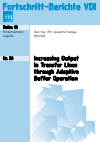Zusammenfassung
This thesis is intended for engineers and scientists in the field of production. It deals with the goal of increasing output in (serial) transfer lines and simultaneously decreasing labor costs without need of change to the structure of the production system. For this the method adaptive buffer operation is developed, implemented and validated. Adaptive buffer operation proposes a different way of operating buffers, improving the decoupling effect of buffers. The buffers are filled to certain target fill levels at fixed moments (times of the day). Apart from the target fill levels further parameters, e.g. moments of intervention or the intervention frequency, are identified. To find out how to operate the buffers and which parameter combinations work best, a simulation-based optimization method is proposed. This method is split into the evaluative methodology, here simulation, and the generative technique of evolution strategies, solving the multi-objective optimization problem. Proo...
Schlagworte
Transfer Lines Simulation Multi-Objective-Optimization Evolution Strategies Automotive Production Manufacturing System Assembly Buffer Adaptive Buffer Operation Decoupling Effect- Kapitel Ausklappen | EinklappenSeiten
- 118–132 References 118–132

